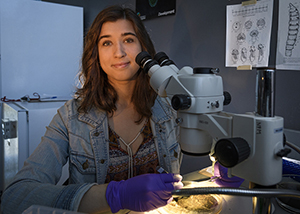
As musical director of Clark University’s all-female a cappella group the Counterpoints, Jenna Libera ’18, has created arrangements that melodiously blend soprano and alto voices. In her academic work, she likewise has skillfully harmonized double majors in biology and psychology to pursue her interest in neuroscience.

Since arriving at Clark in 2014, Libera has completed two research internships at the University of Massachusetts Medical School in Worcester, first at the Center for Comparative NeuroImaging (CCNI) and then at the Department of Biochemistry and Molecular Pharmacology.
This summer, she is beginning her honors project in the lab of her biology adviser, Assistant Professor Néva Meyer, to study the development of the central nervous system in Capitella Teleta, an invertebrate marine worm. She recently received Clark’s Simon and Eve Colin Undergraduate Creativity Award in Psychology, which will fund her senior project.
For Libera, researching even the most complex biological concepts — such as neural stem and progenitor cells, the developmental foundation of the human brain — has not stopped her. The more challenging the concept, the more she is compelled to understand it.
“My majors are prominent in biomedical and health research, so I want to contribute to society by enhancing our knowledge base of how the human brain and mind function,” she says.
As demonstrated by her research projects, Libera already is on the way to fulfilling her goal. And like her singing and arranging of music for the Counterpoints, Libera’s research is built upon collaboration. (At right, watch a November 2016 performance of “Suddenly I See,” an arrangement by Libera for the Counterpoints.)
One of her projects focused on the impact of cannabinoids on the brain by examining the connections between neurotransmitter activity, and impaired cognition and behavior. She completed the research during an internship in 2016 at the CCNI, where she worked with Dr. Guillaume Poirier, an instructor of psychiatry, and Dr. Jean King, director of the center, professor of psychiatry, radiology and neurology, and vice provost for biomedical research at UMass Medical.
Using rats as “addiction models,” the team examined how common drugs such as nicotine in cigarettes and tetrahydrocannabinol (THC) in marijuana affect adolescents’ cognition and behavior. To administer behavioral and cognitive tests, the researchers applied magnetic resonance imaging (MRI) technology to scan the rats’ brains and examine their brain chemistry and neural fiber networks.
During Clark’s Academic Spree Day this spring, Libera presented a poster titled “Investigating the Role of Contingent Self-Worth as a Mediator in the Transmission of Self-Esteem from Mothers to Children,” based on her second research project — her capstone in motivational psychology. Collaborating with her psychology adviser, Professor Wendy S. Grolnick, and graduate students Madeline Levitt and Alessandra Caruso, Libera investigated how mothers’ self-esteem affects the development of children’s self-worth. She found that mothers who place their self-worth in the success of their children tend to have lower self-esteem, which in turn lowers their children’s self-esteem and causes them to feel pressured and controlled.
Through her research now and in the future, Libera hopes to improve global health-care conditions and inspire other women to participate in revolutionizing the fields of science, technology, engineering and math (STEM).
“Science is about studying how the world works, and in doing so, it unites us so we can share and celebrate our discoveries,” she writes in a blog post. “Research is the first step in this process; it is also uniting in itself. I believe that women and other minorities in STEM offer unique perspectives that can lead to greater discoveries. The more diversity we have, the broader the scope we view the world.”
At Clark, Libera appreciates “unapologetically being myself” and finding her own voice through singing and science.
“Being a student at Clark means I can comfortably be myself and share my passion with other Clarkies just as they do with me,” Libera says. “The energy and spirit the student body possesses is empowering.”
Long term, she hopes to reach for an even higher note. “I plan on furthering my education at a biomedical graduate school to eventually earn a Ph.D. in neuroscience. I have no idea where I am going, but I would like to begin this journey immediately after graduating from Clark.”


